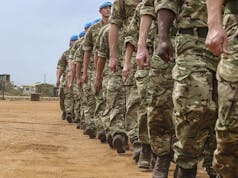The operation began in May, three months after the Iraqi forces had started the total siege of Fallujah. On Monday, Iraqi forces fully recaptured the city of Fallujah from Islamic State.
In January 2014, the Iraqi government lost control of the city to Islamic State. More than 100 people were killed as Iraqi police and tribesmen battled militants who took over parts of two cities on Anbar province.
In February 2016, the Iraqi army and its allies started to encircle the city in the Siege of Fallujah. The name of the current effort is ‘Operation Breaking Terrorism’.
The RAF had also concentrated air operations in the vicinity of Fallujah, assisting Iraqi forces in their battle for the city.
Defence Secretary Michael Fallon said:
“We are playing a major supporting role in the operations to retake Fallujah. Since the start of the Iraqi operation, the RAF have attacked 51 targets in the area – destroying bunkers, tunnels, weapons factories, ammunition dumps, sniper teams and artillery. RAF E3D Sentry aircraft are helping coordinate the coalition aircraft over the operational area and our intelligence and surveillance gathering assets are identifying and tracking the enemy, enabling RAF Tornados, Typhoons and Reapers to help clear a path for the brave Iraqi troops.
All this whilst continuing to conduct strikes against other Daesh targets in Syria and elsewhere in Iraq.”
British forces have concentrated air operations in the vicinity of Fallujah, assisting Iraqi forces in their battle for the city.
Tornado aircraft continue to provide close air support to Iraqi ground forces fighting to liberate Fallujah. One Tornado flight conducted successful attacks using Paveway IV guided bombs against four buildings from which Islamic State were directing machine-gun fire at the Iraqi forces.
A second Tornado mission used a Paveway IV to destroy a building west of the city, within which a terrorist armed vehicle was reported by nearby Iraqi troops to be concealed.
On Friday the 10th of June, Iraq’s counter-terrorism service reportedly moved within two miles of the city centre, and consolidated positions in the south of the city.
The Iraqi army said at the weekend it had secured the first safe exit route for civilians to leave the city,and a Norwegian aid group said thousands of people had already used it to flee in the first day it was open.






Keep it going boy’s. Cleanse your country
Can they hold it? ISIS has withdrawn in the past & it’s been a valid strategy. If it falls again, it won’t be the first time.